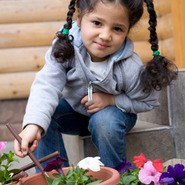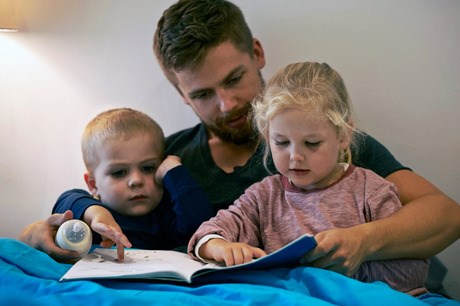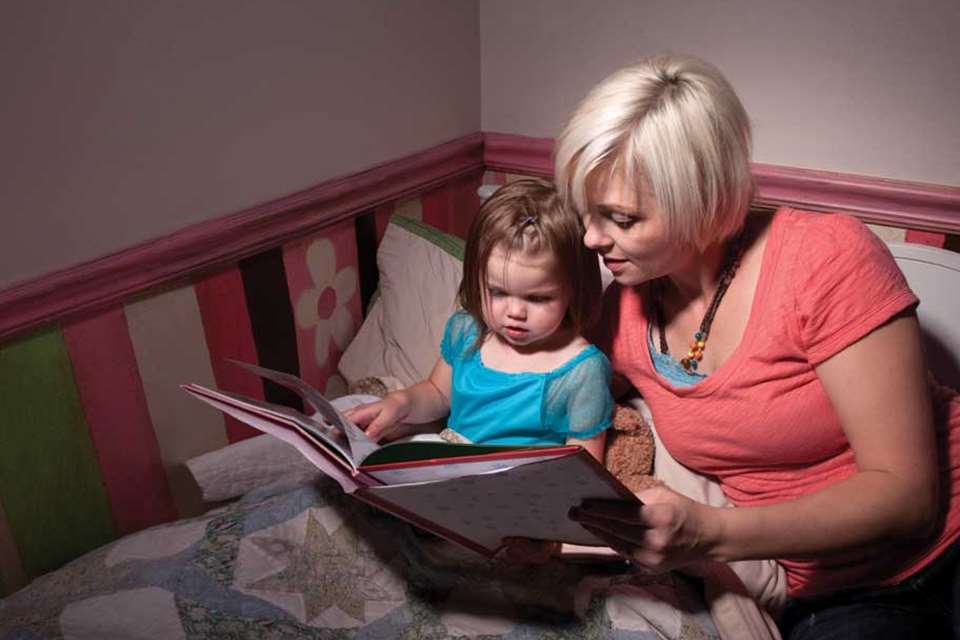Home learning - A parent's guide to...Television time
Penny Tassoni
Monday, July 27, 2015
Too much TV can have a negative impact on development, but when managed well it can actually be a valuable addition to children's everyday experiences. Penny Tassoni explains.

Televisions are a standard feature in most people's homes. Things have moved on since the early days - now colour images, wide screens and surround sound speakers make TV more enjoyable than ever, while DVDs and children's channels have done away with restricted availability of programmes.
But children can now in theory watch hours at a time, leading to concerns about the impact on children's development. So what are the issues around children watching television, how can it be used positively and how can you reduce children's reliance on it?
FIVE THINGS YOU NEED TO KNOW ABOUT TV
1. Not all screen time is the same
It is important to distinguish between children playing games on computers or tablets and watching television or DVDs. The former tends to require children to be more active and so in theory may have more benefits than watching television or DVDs.
2. There are maximum recommended viewing hours
The amount of viewing time considered safe for children is still hotly debated. Having said that, there is fairly broad agreement on the advice that children under two should not be watching television.
 For children between two and five years, the NHS website recommends restricting viewing to two hours a day, including computers and tablets, while some other organisations, such as the National Literacy Trust, suggest just one hour. These limits then allow sufficient time for children to play in the 'real world', be physically active and have opportunities to talk, look at books and build relationships.
For children between two and five years, the NHS website recommends restricting viewing to two hours a day, including computers and tablets, while some other organisations, such as the National Literacy Trust, suggest just one hour. These limits then allow sufficient time for children to play in the 'real world', be physically active and have opportunities to talk, look at books and build relationships.
See www.nhs.uk/conditions/pregnancy-and-baby/pages/play-ideas-and-reading.aspx#close
3. Keep TVs out of the bedroom
Nearly a half of all children have televisions in their bedrooms, but this is not considered advisable. Firstly, it has been shown that the blue light emitted from the screen can inhibit sleep, making it hard for children to fall asleep quickly. A research report suggested that children may lose as much as half an hour's sleep.
Watching TV or DVDs may also mean that children are losing out on bedtime stories, which not only settle children down for sleep but are also helpful in promoting language and literacy skills.
4. Televisions should be turned off when not in use
All current advice suggests that televisions should be turned off when not being watched. This can help children to concentrate more, as they are not distracted by background sounds and images. For babies and toddlers, a television in the background can also make it harder for them to tune in to the sounds of an adult talking to them.
5. Choose age-appropriate programmes
One of the most important factors when children have access to a TV or DVD is that it is age appropriate. Viewing programmes intended for older children or adults can lead to nightmares and emotional problems. Luckily, there are plenty of TV programmes and DVDs designed for children who are five years and younger.
USING TV TO PROMOTE CHILDREN'S LEARNING
There are potential problems linked to watching TV and DVDs, but with careful use and planning it can be a positive experience for your child.
Time to relax
Watching TV together can be enjoyable and relaxing. It is worth thinking about your daily routine and times during the day when your child is tired and so will find it hard to play or do something more active.
You should avoid it becoming part of the bedtime routine though, because it may affect how easily your child is able to fall asleep.
Co-viewing
Watching television or a DVD together with your children can enrich children's viewing experiences and learning. Co-viewing is thought to be one of the best ways to help your child benefit from the TV. The key is to find a programme or DVD that is age appropriate for your child or children, but enjoyable for you too. This will allow you to cuddle up together and talk about what you are watching.
Choosing programmes
There is plenty of research to show that high-quality children's programmes can help them learn to match, count and aquire vocabulary. Look out for programmes that require children to be active as they are watching, joining in songs or looking for matching items. Such programmes often have a narrator who addresses the children directly, - for example, 'Now children can you find ...?' Check also the channel's website for guidance on age range.
Repeated episodes
Watching repeated episodes of an age-appropriate programme can help your child to become familiar with meanings of phrases and words. Look out for DVDs with good content and use these rather than relying on watching several programmes in a row on the television.
Talking about programmes
Once a programme is finished, you can extend your child's learning by talking about what you have watched together - for example, which part of the programme was the most enjoyable or why a character acted a certain way or was feeling a particular way.
CONTROLLING VIEWING
It is important that adults take control of how much, and what, TV their children watch. Early viewing habits can become the pattern for later life and too much TV can leave children without the time or inclination to read, play and be active.
It is also easy to find that over time children gradually watch more TV more often. To rebalance your child's TV viewing, it is not enough just to turn it off. Instead, you have to replace it with other things.
5 TIPS TO REDUCE YOUR CHILD'S TV VIEWING
1. Keep a diary
Start by keeping a daily diary over the course of a week to see how much the television is on, what is watched and at what time. It may be that your child is actually watching less than you had thought. If you do have concerns, use the information to work out when would be the best times to cut down TV time.
2. Introduce ground rules
If your child is able to choose when to turn on the TV or put on DVDs, it is a good idea to introduce some ground rules. It is worth starting a day by not having the television on and if necessary unplugging it or putting the remote out of your child's reach. This introduces the idea of asking for an adult's help to put on the television.
You could also cover up the TV with a cloth and put the DVDs into a box. When children can't see the them, they are less likely to want them, as in the old adage 'out of sight, out of mind'.
3. Organise resources
Children are naturally playful and we know that play can develop many skills, including imagination, hand skills and problem-solving.
If children spend less time watching television, they have more time to play. To encourage children to play more, think about having a rotating system in place for their toys. Keep their favourite toys out all of the time, but have boxes that come and go during the week so that children have a fresh toy to play with each day or so.
4. Provide distractions
Sometimes children use television when they can't think of anything else to do. If your child wants to put on the television, do not say 'no', but instead put in a counter-offer by suggesting something else. This could be anything from cooking with you to playing a game. You could also put out some toys or books ready to greet your child in those times when their usual habit is to put on the television - for example, first thing in the morning or after a nap.
5. Create times with books
Watching television can be relaxing for children and many parents allow their child to watch it when their children are tired. However, while some television viewing is fine, if you are trying to cut back your child's time in front of the TV, think about sharing books at these times instead. Cuddling up to an adult on a sofa and listening to a story can work wonders. Also, if your child tends to watch some TV in their bedroom, start to share books with your child at bedtime instead, with the aim of taking the TV out of the bedroom completely.

COMMON QUESTIONS
Q. Our three and nine-year-old often argue about what to watch. What do we do?
A. Your children are at very different stages in their development and so will probably have different play as well as TV preferences. For watching TV to be a positive thing for them, the material they watch needs to be age appropriate.
Try introducing a specific 'slot' for your younger child in which your older child can opt in or out of. Also give your older child their own 'slot' during which you may need to distract and entertain your younger child. This type of juggling is tricky, but necessary.
There is much evidence to suggest that if young children are watching material aimed at older children, it can lead to nightmares and disturbed sleep as young children are not so sophisticated at distinguishing between what they see on a screen and reality.
Q. My baby is seven months old. Should I buy DVDs that claim to boost babies' and toddlers' intelligence?
A. While parents have to make their own choices about what they buy for their children, research into these DVDs suggests that they make no difference to a child's intelligence. This is because children of this age learn about language and the world from talking, touching and doing. Overall, the advice is that TV and DVDS should be avoided for children under two years, as they need a lot of interaction and physical contact with their parents instead.
ACTIVITIES LINKED TO TV
Role play
Some TV programmes can be turned into role-play opportunities. A child might want to act out or use small-world play to recreate scenes or ideas from programmes.
If you are keen, you could also take a role based on programmes such as Charlie and Lola.
Linked activities
If your child has enjoyed a programme, look at ways of using it as a starting point to do something with your child. A good example of this is using Mr Bloom's Nursery to do some gardening or growing some plants in pots, indoors or outside.
Early writing
Some children's programmes also produce merchandise. Buying one or two items of merchandise such as writing paper, stickers or felt tips can be a great motivator to encourage your child to enjoy early writing and mark making.









